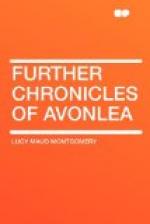“Ismay, the house is on fire!” I shrieked, as I flew to the door.
“Sue,” cried Max, “I saw Fatima, or her ghost, at the garret window a moment ago!”
“Nonsense!” I cried. But Ismay was already half way up the stairs and we followed. Straight to the garret we rushed. There sat Fatima, sleek and complacent, sunning herself in the window.
Max laughed until the rafters rang.
“She can’t have been up here all this time,” I protested, half tearfully. “We would have heard her meowing.”
“But you didn’t,” said Max.
“She would have died of the cold,” declared Ismay.
“But she hasn’t,” said Max.
“Or starved,” I cried.
“The place is alive with mice,” said Max. “No, girls, there is no doubt the cat has been here the whole fortnight. She must have followed Huldah Jane up here, unobserved, that day. It’s a wonder you didn’t hear her crying—if she did cry. But perhaps she didn’t, and, of course, you sleep downstairs. To think you never thought of looking here for her!”
“It has cost us over a hundred dollars,” said Ismay, with a malevolent glance at the sleek Fatima.
“It has cost me more than that,” I said, as I turned to the stairway.
Max held me back for an instant, while Ismay and Fatima pattered down.
“Do you think it has cost too much, Sue?” he whispered.
I looked at him sideways. He was really a dear. Niceness fairly exhaled from him.
“No-o-o,” I said, “but when we are married you will have to take care of Fatima, I won’t.”
“Dear Fatima,” said Max gratefully.
II. THE MATERALIZING OF CECIL
It had never worried me in the least that I wasn’t married, although everybody in Avonlea pitied old maids; but it did worry me, and I frankly confess it, that I had never had a chance to be. Even Nancy, my old nurse and servant, knew that, and pitied me for it. Nancy is an old maid herself, but she has had two proposals. She did not accept either of them because one was a widower with seven children, and the other a very shiftless, good-for-nothing fellow; but, if anybody twitted Nancy on her single condition, she could point triumphantly to those two as evidence that “she could an she would.” If I had not lived all my life in Avonlea I might have had the benefit of the doubt; but I had, and everybody knew everything about me—or thought they did.
I had really often wondered why nobody had ever fallen in love with me. I was not at all homely; indeed, years ago, George Adoniram Maybrick had written a poem addressed to me, in which he praised my beauty quite extravagantly; that didn’t mean anything because George Adoniram wrote poetry to all the good-looking girls and never went with anybody but Flora King, who was cross-eyed and red-haired, but it proves that




